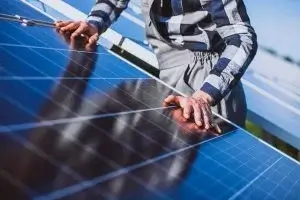
In recent years, solar panels have really come into their own as a cost-friendly option for sustainable energy that allows you relative independence from an increasingly expensive electric grid. The savings potential of a good solar panel system cannot be ignored, and, more and more, businesses are installing solar panels in order to take advantage of the technology’s enormous benefits. So, if you want to save some money as you help save the environment, solar panels might be right for your business. In this blog, we’ll take a look at why solar panels are such a good option for energy savings.
When looking at the potential energy savings of solar panels, it’s important to understand how they work. Solar panels, as the name suggests, take advantage of the incredible amount of power that the sun creates. Every hour, energy from the sun that hits the earth exceeds what the entire human race uses in a year. In order to take advantage of all this energy, solar panels are made up of solar cells that are able to convert that energy into something that we can use. When a photon from the sun hits one of these solar cells, they knock an electron loose from their atom. This process generates a flow of electricity, which can then be used to power whatever you may need at your place of business.

Any excess electricity that your solar panels produce gets exported to the grid, and, if you need more electricity than your solar panels are capable of producing, you can draw from the grid. This means that you should always have a reliable flow of electricity, unless, of course, something happens to the grid. And that’s how solar panels work.
To add to our discussion of how solar panels work, it’s also important to look at how much electricity a solar panel actually produces. A good shorthand for this is that, on average, 1 kW of solar panels will generate 4 kWh of electricity per day. Of course, in the real world, this is much more complex. How much electricity your solar panels will generate is dependent on several factors, from your location, the time of year, cloud cover and other weather factors, the orientation of your panels, the age of your panels, and more. However, in general, you should generate about 4kWh of electricity for 1kW of solar panels.

If you’re drawing all your electricity from the grid, you’re likely paying a hefty chunk of change. As much as we love our home, Australians do pay some of the highest electricity bills in the world. When measured by price per kilowatt-hours (kWh), Australians are paying more than people in other wealthy countries like France, Canada, and the USA. If you’re paying that much for electricity, it could be a huge boon to consider alternatives such as solar panel technology.
There are several factors to consider when determining how much you’ll save if you install solar panels.

The first is, of course, to look at your current electricity bills. Look at what you’re paying currently and you can estimate how much you’d save if you switch to solar panels.
The next is to determine when during the day your business uses electricity the most. Typically, most businesses will use the bulk of their electricity during the day, which naturally matches up well with solar panels.
Then, you can look at the size of the roof of your business building or how much space in general you have to install solar panels. The more solar panels you have, the more electricity you can generate, so it’s important to determine how much space you have to install solar panels.
Finally, it’s good to look at your future goals or objectives for your business. If you’re planning on moving businesses in the near future, it might not be the best idea to invest in solar panels (although doing so will likely raise the property value of your building). On the other hand, reducing operational costs through a lowered electricity bill can help you grow your business. The less money you spend on electricity, the more you can reinvest back into your business.
In general, solar panels are a good investment and provide a lot of energy savings. With typical solar panel installations, you’ll get an ROI in as quickly as two years, or as long as three to four years based on how expensive your panels are. Though there’s certainly an upfront cost associated with installing new solar panels, they very quickly pay for themselves and come with several added benefits. It’s never a bad idea to consider solar panels for your business.
© Copyright 2026 Todae Solar. All rights reserved